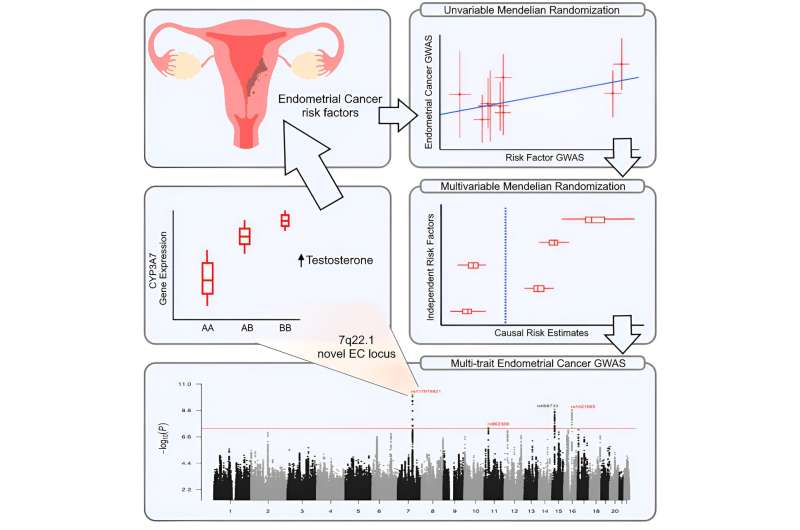This article has been reviewed according to Science X's editorial process and policies. Editors have highlighted the following attributes while ensuring the content's credibility:
fact-checked
peer-reviewed publication
trusted source
proofread
Common hormone could hold key to treating endometrial cancer

New research from QIMR Berghofer has found that the hormone testosterone may play an important role in the development of endometrial cancer.
The discovery raises exciting new possibilities for screening, preventing and fighting this increasingly prevalent disease.
Endometrial cancer is the fourth most common cancer in Australian women and its incidence is rising. Yet treatment options are limited, with a hysterectomy often the first line of defense.
The new study by Associate Professors Tracy O'Mara and Dylan Glubb gives hope that existing hormone therapies may offer another option.
"Everyone has testosterone, but our research suggests that women with higher levels of the hormone are at greater risk of developing endometrial cancer," said A/Prof O'Mara, the senior author on the study.
"In establishing an independent relationship between testosterone and endometrial cancer, the study opens up potential new avenues for treatment.
"We're really excited by these findings and hope that with further research, we might be able to treat endometrial cancer by targeting or inhibiting testosterone with existing drugs."
In the study published in the journal iScience, the researchers carried out advanced genetic analysis to identify five independent risk factors for endometrial cancer. These risk factors include body weight, age at onset of menstruation and menopause, and testosterone levels.
The testosterone connection was related to a specific region of the human genome which the study discovered has links to a higher risk of endometrial cancer.
"It is very promising to see testosterone levels emerge so strongly as a likely risk factor, because a person's testosterone can be modified," O'Mara said.
"There are already approved drugs designed to block and counteract the hormone's effects. Further research may justify trying to repurpose those drugs to help women with endometrial cancer.
"It is really important that we do find more therapeutic options, as the current first line treatment for endometrial cancer is a hysterectomy. This is obviously highly invasive, and affects fertility in younger patients."
Glubb said they would use laboratory-grown organoids resembling endometrial cancer tumors, to investigate genes involved in the development of the disease.
"We have identified a significant number of genetic regions linked to endometrial cancer, but we don't yet know which particular genes are involved. This study allows us to test which genes are important for the growth of the organoids and the endometrial cancer tumors they represent.
"Our ultimate goal is finding new genes which can be targeted to treat endometrial cancer, as we know drugs with a genetic basis are more likely to be effective."
More information: Xuemin Wang et al, Multi-trait genome-wide association study identifies a novel endometrial cancer risk locus that associates with testosterone levels, iScience (2023). DOI: 10.1016/j.isci.2023.106590



















